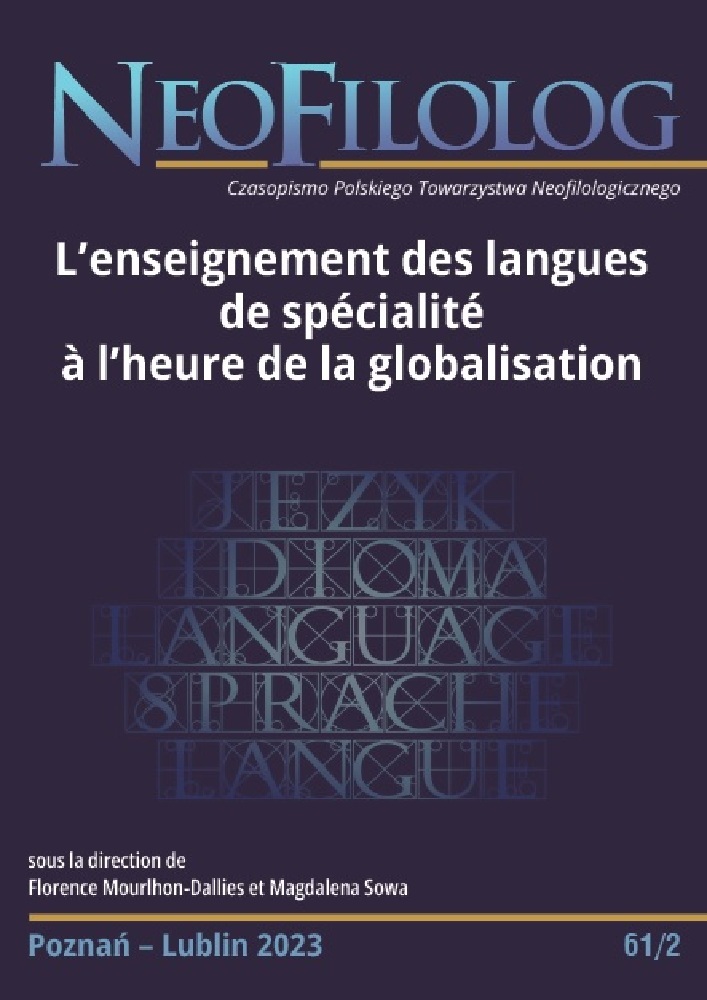Résumé
The article examines the ways intercultural aspects are dealt with in textbooks for learning business language (in the broad sense) in French, Spanish and Italian. The authors of the textbooks analyzed represent different approaches, both at the level of the declared learning objectives and at the level of the techniques applied.
Among the textbooks analyzed there are also those oriented towards the development of intercultural skills. Their goal is not so much to prepare the learner to evolve in a given culture, but to make them aware of the differences between their own and the target culture(s)and to be able to mediate between the representatives of each of them. Although in a textbook for the teaching/learning of a foreign language for specialized purposes, intercultural training preparing for “culture shock” must necessarily be limited, the examples observed show that educators aware of the importance of this issue can offer interesting solutions and proposals.
Références
Bandura E. (2007), Nauczyciel jako mediator kulturowy. Kraków: Tertium.
Bargiela-Chiappini F. (2007), Intercultural Business Discourse, (in:) Candlin Ch. N., Gotti M. (dir.), Intercultural Aspects of Specialized Communication. Bern: Peter Lang, 29–51.
Clyne M. (1994), Inter-cultural Communication at Work: Cultural Values in Discourse. Cambridge: CUP. DOI: https://doi.org/10.1017/CBO9780511620799
Conseil de l’Europe (2001), Cadre européen commun de référence pour les langues : apprendre, enseigner, évaluer. Strasbourg : Didier.
Cuq J.-P., Gruca I. (2003), Cours de didactique du français langue étrangère et seconde. Grenoble : PUG.
Gajewska E. (2011), Préparer à communiquer avec les représentants d’autres cultures professionnels dans le cadre d’un cours de langue sur objectif spécifiques, (in :) Sowa M. (dir.), L’interculturel en pratique. Lublin : Werset, 50–63.
Gajewska E., Sowa M. (2014), LSP, FOS, Fachsprache. Dydaktyka języków specjalistycznych. Lublin : Werset.
Gotti M. (2007), Introduction, (in :) Candlin Ch. N., Gotti M. (dir.), Intercultural Aspects of Specialized Communication. Bern: Peter Lang, 9–25.
Grucza S. (2006), Idiolekt specjalistyczny – idiokultura specjalistyczna – interkulturowość specjalistyczna, (in:) Lewandowski J., Kornacka M., Woźniakowski W. (dir.), Języki specjalistyczne 6: Teksty specjalistyczne w kontekstach międzykulturowych i tłumaczeniach. Warszawa: KJS UW, 30–49.
Isani, S. (2004), Compétence de culture professionnelle : définition, degrés et didactisation. « ASp », no 43–44, 5–21. Online : http://journals.openedition.org/asp/979 [consulté le 09 juin 2023]. DOI: https://doi.org/10.4000/asp.979
Journet N. (2002), La culture. De l’universel au particulier. Paris : Ed. Sciences Humaines.
Kuźma R. (2008), (Nie)obecność treści międzykulturowych we współczesnych podręcznikach do nauki języka angielskiego, (in:) Harbig A.M. (dir.) Nauczanie języków obcych w szkole wyższej. Białystok: Wyd. UwB, 159–170.
Mackiewicz M. (2010), Standardy kulturowe a dydaktyka języków obcych, (in:) Mackiewicz M. (dir.), Kompetencja interkulturowa w teorii i praktyce edukacyjnej. Poznań: Wyd. WSB, 137–149.
Rescia L. (2007), Le Français des Affaires pour le cursus de Mediazione Linguistica : une approche multidimensionnelle et interculturelle. « Synergies Italie », no 3, 32-38.
Saint-Georges I. de (2004), Actions, médiations et interactions : une approche multimodale du travail sur le chantier. « Cahiers de linguistique française », no 26, 320–341.
Sowa M. (2005), Comment développer la compétence interculturelle lors des cours de FLE ? « Roczniki Humanistyczne KUL », no LIII/5, 151–168.
Licence
© Elżbieta Gajewska 2023

Ce travail est disponible sous licence Creative Commons Attribution - Pas de Modification 4.0 International.
Auteurs :
Les auteurs de textes acceptés pour publication dans la revue Neofilolog sont tenus de remplir, signer et renvoyer à l'adresse de la rédaction, un accord sur l'octroi d'une licence gratuite pour les œuvres, avec obligation d'accorder une sous-licence CC.
En vertu de cet accord, les auteurs des textes publiés dans la revue Neofilolog accordent à l'Université Adam Mickiewicz de Poznań une licence non exclusive et gratuite et permettent l'utilisation de la sous-licence Creative Commons Attribution-NoDerivatives 4.0 International (CC BY-ND 4.0).
Les auteurs se réservent le droit de disposer librement de l'œuvre.
Utilisateurs :
Les utilisateurs d'Internet intéressés ont le droit d'utiliser les œuvres publiées à partir de l'année 2017 sous réserve des conditions suivantes :
- reconnaissance de la qualité d'auteur - l'obligation de fournir des informations sur la qualité d'auteur, le titre, la source (liens vers l'œuvre originale, DOI) et la licence, ainsi que l'œuvre distribuée ;
- sans créer d'œuvres dérivées - l'œuvre doit être conservée dans sa forme originale, p. ex. les traductions ou les interprétations ne peuvent être distribuées sans le consentement de l'auteur.
Tous les textes publiés sont soumis au droit d'auteur.
Autres :
L'Université Adam Mickiewicz de Poznań se réserve le droit à la revue dans son ensemble (mise en page, forme graphique, titre, conception de la couverture, logo, etc.).
.

